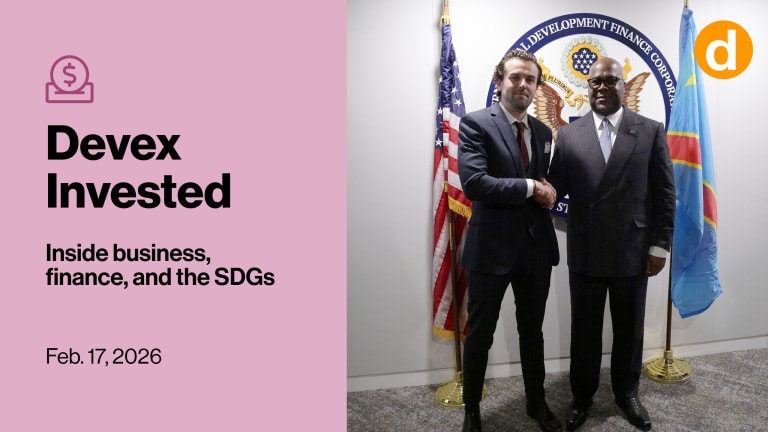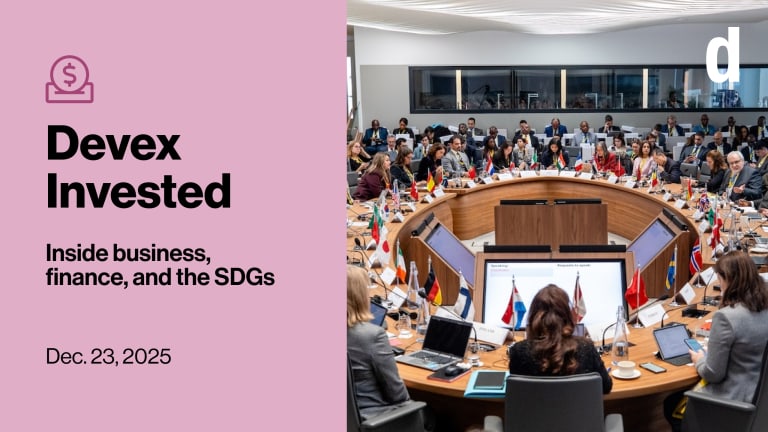Devex Invested: Amid decline in US aid, can private finance save the day?

The dramatic halt to U.S. foreign aid is having a seismic impact on development finance. But the decline in official development assistance, or ODA, in many countries shines a spotlight on an issue we’ve often written about: private finance.
One potential outcome is that countries will turn more to their development finance institutions and focus more on private capital mobilization, Samantha Attridge, a principal research fellow at ODI Global, said during a Devex Pro event Monday.
But it might not be that easy. USAID has long played a key role in helping build financial markets — from supporting entrepreneurs to de-risking investments to helping create impact investing and business ecosystems, Elizabeth Boggs Davidsen, CEO of GSG Impact, said at the event.
“Dismantling USAID is going to create significant funding gaps, and it's just going to make it harder for us to mobilize private capital and achieve impact at scale,” she said.
So the question becomes how to do more with less, which is something many of the multilateral development banks have been asking themselves — with encouragement from their shareholders.
And one trend we’re likely to see more of this year is a shift among MDBs to move from an “originate to hold” model — where they retain loans on their books — to an “originate to share” strategy that brings in private investors. IDB Invest’s securitization deal last year is an example. And both the International Finance Corporation and the African Development Bank have securitization transactions in the works.
Those efforts are partly aimed at building a development finance asset class. But there are a few things holding back private investment, Arsalan Mahtafar, the head of the J.P. Morgan Development Finance Institution, said at the event. There needs to be a clear definition of development finance that aligns the definitions DFIs use with those that exist in the private sector, he said. De-risking instruments and blended finance are also important. Mahtafar is a big fan of guarantees because they are a standard product that’s easy for the private sector to use. Another bugaboo: data. Both the quality of it and transparency on everything from impact to performance.
Many of these issues will be on the agenda of the International Conference on Financing for Development in Seville, Spain, in late June. The debt crisis — also a key trend to keep an eye on — new financing models, climate investment, and reform of the global financial architecture will also be key points of discussion. What emerges could help set the foundation for development finance cooperation for years to come, Boggs Davidsen said.
Oh, and Mahtafar said that if the forum intends to include private sector finance as a key goal or outcome, it should be sure to actually include private financiers in the discussion.
Read: As US aid falters, development finance trends to watch in 2025 (Pro)
Related opinion: The world must reshape global finance at 2025 UN summit
+ A Devex Pro membership helps sustain the journalism we’re able to bring you. Not yet gone Pro? Start your 15-day free trial today to access all our expert analyses, insider insights, funding data, exclusive events, career resources, and more. Check out all the exclusive content and events available to you.
Return to duty station
Last week, we reported that the U.S. International Development Finance Corporation, or DFC, was planning to terminate all of its probationary employees, or its most recent hires. Since then, staff have also been informed that they will all be required to work full time, in person, at DFC offices or their foreign duty stations by April 21.
In recent years, DFC has hired a lot of staff, and quite a few of those have been hired remotely, so the return-to-office policy, which is the result of an executive order, is likely to result in a reduction in staff. Several sources tell Devex that the legal department is likely to be hit particularly hard by these changes because many were hired as remote workers and are in their probationary period. One source even reports that a shortage in legal staff is already impacting the agency’s business, with there not being enough lawyers to assign to new projects.
ICYMI: Staff cuts coming to DFC
+ Having trouble keeping up with all the staffing and development work upheavals caused by the funding freeze? We’ve created an essential guide to track the impact for you. Check it out here.
All together now?
Trump’s move is reverberating around the world. Australia is a regular ally of the U.S. in the Pacific, be it through the “Five Eyes” intelligence pact or the more recent AUKUS security partnership alongside the United Kingdom.
We asked the Australian government on Jan. 31 how the aid freeze will affect Australia’s joint development work with the U.S., such as the Mekong Safeguards program on sustainable infrastructure or the PNG Electrification Partnership.
A spokesperson for Australian Foreign Affairs Minister Penny Wong wrote back on Feb. 7 that “the decision to pause United States Official Development Assistance for policy review is a matter for the US Administration.”
“Australia’s development program is focused on being a partner of choice for our neighbours,” the spokesperson wrote, noting that, “We want to empower our neighbours to ensure the Pacific can meet its own development and security needs.”
We pointed out that this hardly answered our question about the status of joint Australian-U.S. development work. But the spokesperson spoke no more.
Old road rapidly aging
It passed without much hubbub, but Belgium joined the ranks of those European countries cutting foreign aid recently. Its new governing coalition agreed to reduce the aid budget — including humanitarian and multilateral assistance plus support to NGOs and the Belgian development agency Enabel — by 25% over five years.
We spoke to Jean Van Wetter, the head of Enabel, who noted that not only was the cut substantial, but it passed with scant attention from local media.
“You are the first journalist who called me on that,” he tells Vince. And that prompted some somber reflections.
On the state of public support for foreign aid: “For me the movement of international NGOs was born in the ’70s and ’80s and ‘90s, where you had a generation very involved. But I think we lost in a way the public support over the last 10 years,” Van Wetter says. “Even my closest friends … still think that we are helping poor people only by constructing a well, by renovating a school. They don’t understand that we work on climate, on energy transition, on security issues, on governance issues.”
And on what cuts in the U.S., France, Germany, Sweden, the Netherlands, and now Belgium could mean for the U.N. financing for development conference: Enabel will be co-president of the Practitioners’ Network of European development organizations during the summit. His message is: “We need to completely review the way we do international development.” When it comes to the charitable global north-south approach, or even the idea of wealthy countries giving 0.7% of their gross national income as ODA, “it’s gone,” Van Wetter says.
Read: Belgium just cut its foreign aid by 25%. Does anybody care? (Pro)
Background reading: A look back at European aid’s slash-and-burn year (Pro)
EU trips on leveling up
We brought you details last month on the European Commission’s plans to shrink its global footprint of development staff, and instead concentrate efforts in 18 hubs abroad. It’s part cost-cutting, part geostrategic imperative, according to the internal document we reported.
But, as you can imagine, the staff (and staff unions) are less than thrilled. And that meant some smoothing over was in order when the new European commissioner for international partnerships, Jozef Síkela, addressed European Union ambassadors at their annual meeting in Brussels last Thursday.
The speech makes a handy précis of the current state of EU development policy, culminating in, “What … we need is to be more efficient, professional, and specialized, to provide our companies … with proper assistance and help them seek opportunities for their business.”
That’s why, Síkela said, “we are thinking of possible reorganization of the Delegation network,” before adding that “much of what has been written in the press does not reflect the current discussions.”
“I can assure you that whatever is proposed will go through the proper staff consultations and that any potential changes will be gradual,” Síkela added. “You can reassure staff that they will be fully involved before decisions are made on which hubs will be created, where they will be based, and what we expect from them.”
As one observer who likes to walk on the wry side observed to us privately this past week: “He goes from the media misrepresented the plans to create the regional hubs to we’re going to consult you closely and then this will be the outcome regardless of what you tell us.”
ICYMI: EU wants development staff in regional hubs, not delegations (Pro)
Your next job?
Director, Ethics and Compliance
Corus International
United States (hybrid or remote)
In other news
Exclusive: Donors commit $10 million to include African languages in AI models. [Devex Pro]
U.S. development financing freeze imperils private investments in Africa. [Impact Alpha]
How the U.S. aid freeze affects nearly $60 billion in USAID spending. [Devex Pro]
USAID shutdown “undermines global impact investing ecosystem.” [Pioneers Post]
U.K. bilateral aid rises sharply after predicted cuts averted. [Devex]
Search for articles
Most Read
- 1
- 2
- 3
- 4
- 5









